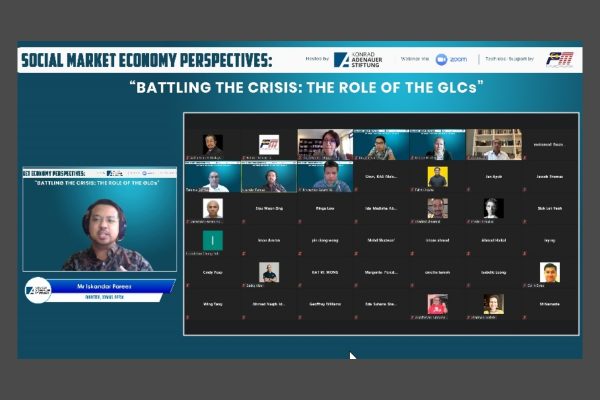Description
Over the past month, a series of unfortunate events brought to the fore the need for the Malaysian government to review how its government-linked companies (GLCs) are managed. At the same time, the current lockdown additionally severely undermined companies and deeply battered livelihoods. Organised by Konrad-Adenauer-Stiftung (KAS), the webinar invited a panel of experts to discuss ways forward for Malaysia to a swift and well-conceived response to deal with the economic and social repercussions of the ongoing crisis. This involves effective employment of Malaysia’s huge number of GLCs to ensure adequate supply of health services, support SMEs, keep people employed, and create a public delivery system that gets aid to the ground promptly.
Summary and Our Take
REFSA Communications Director Iskandar Fareez was a panellist in a webinar held on 14 June 2021 titled “Battling the Crisis: The Role of the GLCs”. During the two-hour session, Iskandar explored the responsibilities that the government and government-linked corporations (GLCs) should undertake as part of short- and long-term strategies for Malaysia to weather the Covid-19 crisis. Here is a summary of his main points:
GLCs as vehicles to drive social impact
GLCs require a centralised and overarching philosophy in line with broader national socio-economic and developmental objectives. Iskandar opined that the government should thus reorient GLCs to achieve common societal goals. In this regard, GLCs should position themselves as trailblazers in the economy to encourage the crowding-in of private investment. There is tremendous scope for GLCs to catalyse value addition in existing sectors and to act as seed funders for emerging sectors. They can be key drivers of innovation and participate in seeking solutions to increase social impact in areas such as climate change and Environment, Social and Corporate Governance (ESG). Ultimately, GLCs should be bearers of championing stakeholder capitalism, which entails serving not only shareholders but also key stakeholders, such as workers, clients, consumers at large, and the environment.
But in driving social impact, GLCs cannot operate in isolation. The government itself needs to focus on building capacity for proactive problem-solving. This entails leveraging GLCs as part of a strategic rethinking of industrial policy following the pandemic, in which policy priorities are tied to overall ‘missions’ that call for a high standard of living, inclusive development and environmental sustainability. Accordingly, the government should have in place a mission-oriented approach that provides GLCs with the opportunity to actively participate in bringing solutions to the challenges we have at hand.
Patient, long term, committed finance
Mission-oriented policy that addresses developmental challenges requires not just any type of finance but patient, long-term, committed finance. In this context, GLCs are well suited to be at the forefront of providing early investments to finance long-term strategies when industries and the private sector are generally dominated by short-term thinking. This has taken different forms in different countries, including public R&D agencies such as the USA’s Defense Advanced Research Projects Agency (DARPA). In Malaysia, GLCs like Khazanah are best poised to be strategically mobilised to direct the strategic direction of the economy with a deeply ingrained social lens, towards national social goals like a post-Covid-19 new industrial policy.
Profit motive with a purpose
Further, in championing stakeholder capitalism, GLCs’ pursuit of profits should be aligned with purpose. GLCs have considerable potential to act as an effective bridge between the public and private sectors. What this means is that GLCs should create shared value through their operations, shaping markets that bring about positive societal outcomes.
Consumers these days are more and more aware of how businesses and companies relate themselves to the wider societal issues. GLCs need to get in with the times and be leaders in promoting good societal behaviours, addressing issues such as:
- Paying fair wages and salaries,
- Pioneering progressive benefits – e.g. paid parental leave, wellness leave,
- Reducing the CEO-worker pay ratio,
- Diversity in the workplace,
- Ensuring safety in the workplace, especially during Covid-19,
- Investing in local communities, and
- Preventing environmental damage.
Transforming GLC governance
For GLCs to fulfil the aforementioned roles, the GLC ecosystem requires effective oversight and coordination. Currently GLCs lack an independent monitoring mechanism to guarantee accountability, transparency and trust. There is a need to review overlapping responsibilities and sometimes counterintuitive roles with existing GLCs. The creation of a governance and accountability model consistent across all GLCs could serve the goal of improving their efficiency. Accountability standards, such as requiring chairpersons to pass a fit-and-proper test by the regulating entity or a Parliamentary Select Committee (PSC), could serve to disentangle GLCs from politics. This should be complemented with a performance management system and reporting mechanism for all these organisations.
Conclusion
We must reorient the GLCs to achieve common societal goals that are streamlined with larger government and society missions. Iskandar concluded with a key framework that GLCs, as the vehicles of driving social impact, must be sustainable, coordinated and mission-oriented. Apart from regaining public trust, our GLC ecosystem needs to be reoriented to solve problems proactively, achieve societal goals and encourage innovation. GLCs have a role in creating a vibrant SME environment, not crowd them out, but rather energise them through the resources they have. In times of crisis, he highlighted the government’s role to bring together all parties – GLCs, higher learning institutions, private sector, and labour force – in a coordinated effort against the pandemic.




